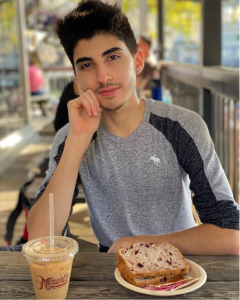¡Felicidades a Abdel Barbosa!
El equipo de TeCHS y COERLL se enorgullecen en presentar al Student Spotlight del mes de diciembre: Abdel Barbosa. Actualmente él está cursando su segundo año en la Universidad de Texas en Austin. Él fue nominada por la Dra. Dale Koike.
A continuación Abdel nos comparte un poco más sobre él.
 “My name is Abdel Barbosa, a second-year student at the University of Texas at Austin born and raised in the Rio Grande Valley (RGV) of South Texas. Currently, I am studying to major in Economics and am pursuing a second major in International Relations/Global Studies (IRG). Although I may have been born in the United States as the son of immigrant parents, my life was equivalently tied to both my American and Mexican nationalities. Growing up in a border region along Mexico was very influential to my upbringing, as using and increasing my Spanish proficiency was necessary if it meant communication with my family and among the Mexican public. My childhood was dictated by bilingualism, learning, and utilizing Spanish from an early age at home with my parents while mastering English at school. Additionally, traveling between the RGV and Monterrey, Mexico (my parent’s native home) meant I would undergo a great deal of “code-switching” between speaking Spanish with family members while using English more heavily in the USA and with my sibling. As such, one piece of advice I would recommend to fellow Spanish heritage students would be to not give up on learning or using the Spanish you already know. Speaking from experience, it may feel as if it gets increasingly more difficult to be able to speak Spanish in everyday conversation as the English we use in school or with social circles formed in classes, clubs, or organizations becomes more dominant as we grow older. However, that should not discourage us from making an effort to use our Spanish and instead help us find the opportunity to delve further into our cultural heritage from which we learned Spanish from. Be it through family interactions, joining Latinx and/or Spanish-speaking clubs, or participating in programs involving the use of Spanish, we can not only grow our abilities in conversing in two languages but also be in tune with our heritage and gain vast opportunities that come from being bilingual. For me, as much as bilingualism grants people significant advantages in finding amazing career and internship offers, the personal aspects of using and enhancing my heritage language speak to me just as much. Being able to connect with family members and learn about their experiences while creating memories with them is something I treasure from being a Spanish heritage speaker, allowing me to grow my proficiency as well. In a way, it gives me a sense of belonging to my ancestral Mexican culture, preventing me from becoming detached of the culture that my parents, grandparents, and extended family and friends grew up in. As a result, I have gained valuable experience from learning about Spanish and enhancing my skills whenever I use it. I connect with people who share common experiences and social cultures with me while growing as an individual who is culturally aware of the diverse situations I and others may find ourselves in. Studying Spanish at the collegiate level has also introduced me to concepts and topics I have seldom discussed before, from the variations in a speech to the rules of phonetics and morphology that explain the way we are able to communicate with one another. In the future, I will pursue applying to a study abroad program in Argentina and Chile as part of my area of study for the IRG degree, that being Latin America. Seeing as I will be heavily involved in Latin American studies through the study abroad program and research involving urban economics in Latin America and how it is tied to socioeconomic prejudices against its indigenous populations, I want to capitalize on what I have learned from the Spanish language over the years. Because of these plans, I will need to continue to utilize Spanish in increased contexts and will delve further into the variations I have grown familiar with throughout my college experience. Not only will I feel motivated to grow my knowledge in Spanish and Latin American relations, but also use that to become part of Latin American communities and contribute to solutions and discussions surrounding socioeconomic justice across the region.”
“My name is Abdel Barbosa, a second-year student at the University of Texas at Austin born and raised in the Rio Grande Valley (RGV) of South Texas. Currently, I am studying to major in Economics and am pursuing a second major in International Relations/Global Studies (IRG). Although I may have been born in the United States as the son of immigrant parents, my life was equivalently tied to both my American and Mexican nationalities. Growing up in a border region along Mexico was very influential to my upbringing, as using and increasing my Spanish proficiency was necessary if it meant communication with my family and among the Mexican public. My childhood was dictated by bilingualism, learning, and utilizing Spanish from an early age at home with my parents while mastering English at school. Additionally, traveling between the RGV and Monterrey, Mexico (my parent’s native home) meant I would undergo a great deal of “code-switching” between speaking Spanish with family members while using English more heavily in the USA and with my sibling. As such, one piece of advice I would recommend to fellow Spanish heritage students would be to not give up on learning or using the Spanish you already know. Speaking from experience, it may feel as if it gets increasingly more difficult to be able to speak Spanish in everyday conversation as the English we use in school or with social circles formed in classes, clubs, or organizations becomes more dominant as we grow older. However, that should not discourage us from making an effort to use our Spanish and instead help us find the opportunity to delve further into our cultural heritage from which we learned Spanish from. Be it through family interactions, joining Latinx and/or Spanish-speaking clubs, or participating in programs involving the use of Spanish, we can not only grow our abilities in conversing in two languages but also be in tune with our heritage and gain vast opportunities that come from being bilingual. For me, as much as bilingualism grants people significant advantages in finding amazing career and internship offers, the personal aspects of using and enhancing my heritage language speak to me just as much. Being able to connect with family members and learn about their experiences while creating memories with them is something I treasure from being a Spanish heritage speaker, allowing me to grow my proficiency as well. In a way, it gives me a sense of belonging to my ancestral Mexican culture, preventing me from becoming detached of the culture that my parents, grandparents, and extended family and friends grew up in. As a result, I have gained valuable experience from learning about Spanish and enhancing my skills whenever I use it. I connect with people who share common experiences and social cultures with me while growing as an individual who is culturally aware of the diverse situations I and others may find ourselves in. Studying Spanish at the collegiate level has also introduced me to concepts and topics I have seldom discussed before, from the variations in a speech to the rules of phonetics and morphology that explain the way we are able to communicate with one another. In the future, I will pursue applying to a study abroad program in Argentina and Chile as part of my area of study for the IRG degree, that being Latin America. Seeing as I will be heavily involved in Latin American studies through the study abroad program and research involving urban economics in Latin America and how it is tied to socioeconomic prejudices against its indigenous populations, I want to capitalize on what I have learned from the Spanish language over the years. Because of these plans, I will need to continue to utilize Spanish in increased contexts and will delve further into the variations I have grown familiar with throughout my college experience. Not only will I feel motivated to grow my knowledge in Spanish and Latin American relations, but also use that to become part of Latin American communities and contribute to solutions and discussions surrounding socioeconomic justice across the region.”
